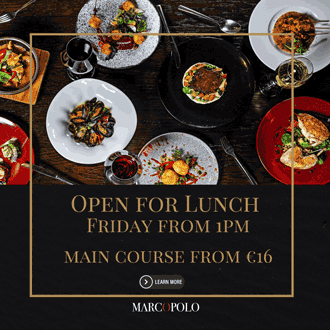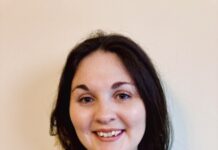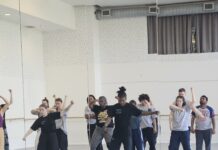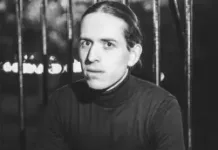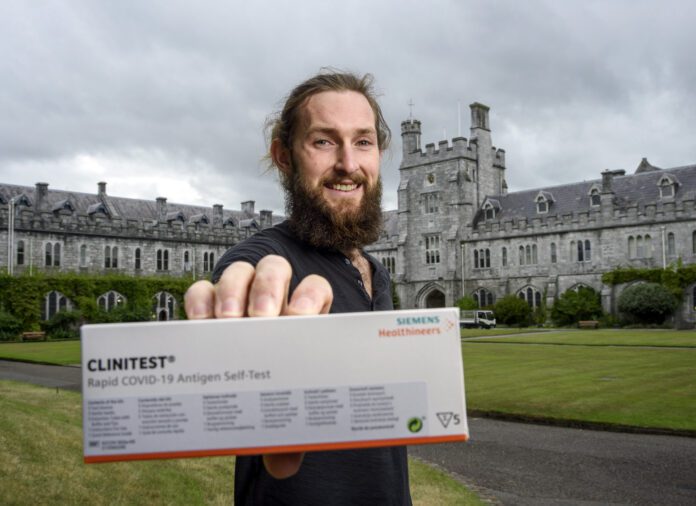
TWO of Ireland’s Olympic heroes have called on their fellow students to row in behind new research that will see UCC students and staff engage in a new Covid-19 rapid testing project.
With students returning to UCC’s campus this month, UCC’s Olympic medal winning rowers Paul O’Donovan and Emily Hegarty have backed UniCoV, a project that will conduct a large-scale comparative analysis of testing technologies for use in disease surveillance and prevention in higher education settings.
These will include rapid antigen testing, saliva-based PCR and LAMP testing and wastewater surveillance. The findings will inform the development of early warning systems for future disease outbreak prevention and control.
Over 1,000 Antigen Tests and 775 PCR Tests were completed before students returned to campus, with these numbers set to rise significantly in the coming weeks.
So far over 425 participants have volunteered in UCC alone, including Quercus scholars Emily and Paul who have shown their support for the project.
Paul said: “I’m delighted to take part in the UniCoV project it allows me to ensure I stay safe on campus and reassures me that we are doing the best we can to prevent the spread of COVID-19”.
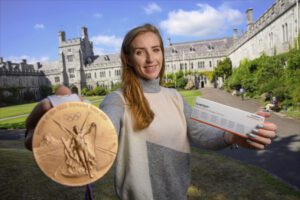
Pic Daragh Mc Sweeney/Provision
Emily said: “This summer I’ve been lucky enough to participate at the Olympics games and take part in a number of events here at home.
“It was really refreshing to be able to get out and get back to competing and it is just as good to get back to campus at UCC, meeting my friends and to enjoy the campus in person!
“A new project which will help to keep UCC campus open and safe is UniCoV. I’m participating in UniCoV as it will help to keep our athletes and UCC Teams safe both on and off the pitch! it is very easy and just takes a few minutes to complete an Antigen test and saliva sample twice a week,” she said.
UCC’s Dr John MacSharry, a co-Principal Investigator on the UniCov project said:
“UniCoV together with face masks, social distancing and vaccination, is another layer to protect our community and to help prevent any asymptomatic spread of SARS-CoV-2.”
Like vaccinations, hand-washing, mask-wearing and social distancing, rapid tests (nasal swabs) have the potential to enhance and complement the existing public health strategy for monitoring the SARS-CoV-2 virus, the virus that causes COVID-19. While vaccination greatly reduces the chances of getting COVID-19, it doesn’t prevent it completely – so monitoring projects such as UniCov have a role to play in the ongoing public health effort.
This study will need members from the whole university community, students and staff, to get involved and volunteer to take part.
By way of a video, volunteers will be trained to perform rapid nasal swab antigen tests and provide saliva samples, to be undertaken twice weekly on Mondays and Thursdays. After completing symptom and infectious-risk checks for COVID-19, volunteers upload an image of their antigen test and scan a barcode on their saliva sample tube via a mobile phone app developed specifically for this purpose by UCC IT Services and UCC Student Health.
Saliva samples are dropped off by participants at the Student Health Department, an on-campus drop off point. Volunteers will receive clear on-app and follow up e-mail advice as to what to do should they have symptoms or should their antigen test or their saliva sample be positive for the presence of SARS-COV-2 virus.
UCC is one of four universities taking part in UniCoV, along with TCD, UCD, and project lead NUI Galway.


